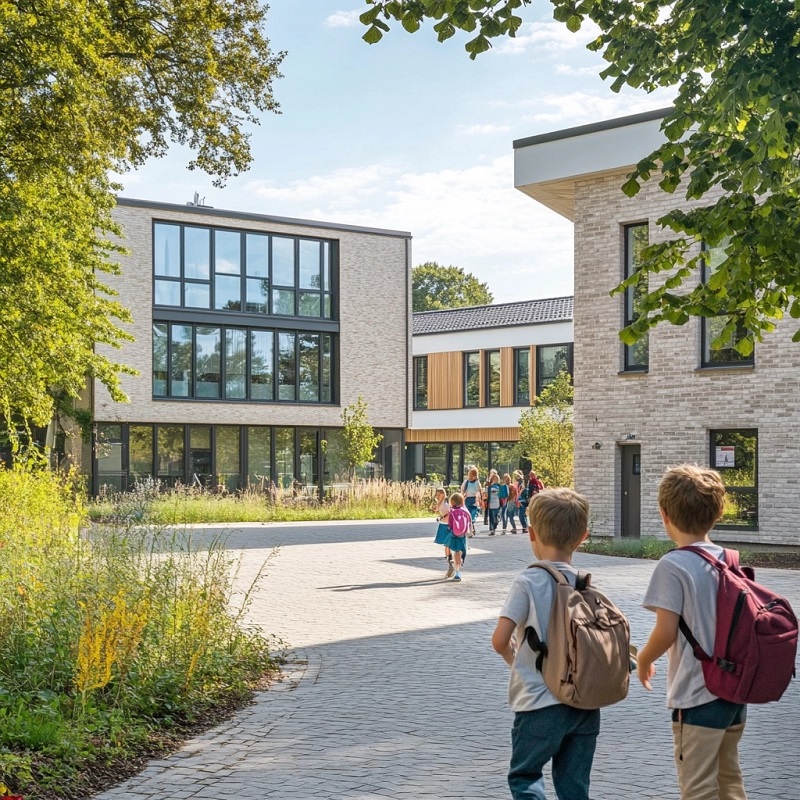
Private and public schools in Brussels: a complete guide
If you’re moving to Brussels or simply looking for a suitable school for your children, you’ll likely have to choose between the Belgian public schools and the many private schools available in the capital.
This comprehensive guide helps you understand the key differences between private schools, international schools, and public schools in Brussels.
Private schools in Brussels: what makes them different?
In Brussels, there are mainly two types of private schools:
- Belgian private schools that prepare students for the central exam board (jury central)
- International schools

1. Belgian private schools
These schools generally follow the official Belgian curriculum and often prepare students for the Central Jury exams of the Wallonia-Brussels Federation. By passing these exams, students can obtain an official Belgian diploma (CESS – Certificate of Upper Secondary Education).
Some private schools in Brussels also offer vocational training, directly aimed at employment. However, be aware: these programs rarely lead to an officially recognized diploma but rather to certificates that can facilitate quick entry into the job market.
2. International schools
In addition to traditional private schools, Brussels has a wide range of international private schools, ideal for expatriate families or those seeking a multicultural, language-immersive education. These schools follow foreign or international curricula, such as:
- The British curriculum (British National Curriculum, IGCSE, A-levels) – e.g., British School of Brussels (BSB)
- International Baccalaureate (IB) – e.g., International School of Brussels (ISB), Montgomery International School
- European Baccalaureate – e.g., European Schools in Brussels
- Montessori pedagogy – e.g., International Montessori Schools
- National-specific programs (French, Japanese, German, American, etc.)
International schools are usually bilingual or multilingual, offering students exceptional cultural exposure from a young age.
How much do international private schools in Brussels cost?
Unlike Belgian public schools, international private schools do not receive state funding and are therefore fully fee-paying. Tuition fees vary widely depending on the school, education level, and optional extras. Generally, fees are either paid directly by the parents or fully/partially covered by the expat parent’s employer.
To explore this in more detail, check our full article on the cost of international schools in Brussels.
How do public schools in Brussels work?
In Brussels, as in the rest of Belgium, schooling is compulsory from ages 6 to 18, and public education is free of charge. However, families are responsible for some school-related expenses such as supplies, outings, textbooks, meals, etc.
The Belgian public school system is organized in three main stages:
1. Preschool (ages 2½ to 6)
- Duration: 3 years (officially from age 3, but entry possible from 2½)
- Goals: motor, social, and language development, and gentle preparation for primary school.
2. Primary school (ages 6 to 12)
- Duration: 6 years
- Certificate: CEB (Certificate of Basic Education), awarded at the end of primary school.
3. Secondary school (ages 12 to 18)
Belgian secondary school lasts 6 years and is divided into three 2-year cycles:
- First cycle (1st and 2nd years): common core program for all students.
- Second cycle (3rd and 4th years): students choose between:
- Transition track (prepares for higher education)
- Qualification track (vocational/professional focus)
- Third cycle (5th and 6th years): students confirm their path:
- Transition: general or technological humanities (university access)
- Qualification: technical or vocational humanities (job market access or specialized higher ed)
At the end of secondary school, students earn the CESS (Certificate of Upper Secondary Education), required for entry into higher education in Belgium or abroad.
Private or public school: how to make the right choice in Brussels?
Choosing between private (international or Belgian) and public schools depends mainly on your family’s goals, budget, preferred language of instruction, and your children’s academic or professional aspirations.
Why choose a private (international) school?
- Multilingual education (English, French, Dutch, etc.)
- Globally recognized academic programs (IB, A-Levels, etc.)
- Small class sizes, personalized support, and expat-friendly environment
- Wide range of extracurricular activities
Why choose a public school?
- Free education
- Proximity to home, quicker integration into local life
- French-Dutch bilingual immersion available in some schools
In summary: Brussels offers a wide range of options to find the school that best fits your family. Take the time to compare, speak with schools, and think through your priorities to make the most informed decision for your children.





